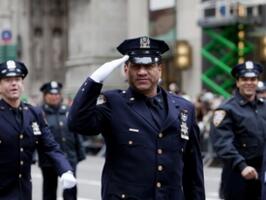Most Say Media Inspires Attacks on Police
Americans strongly believe the media is emphasizing shootings by police officers involving black suspects over ones in which whites are shot and that that media coverage is prompting attacks on police.
A new Rasmussen Reports national telephone survey finds that 71% of America Adults think that given two separate police shootings, the media would give more coverage to an incident in which a policeman shoots a black suspect. Only 11% believe the media would give more coverage to a police shooting in which the suspect is white. Thirteen percent (13%) say the level of coverage would be about the same. (To see survey question wording, click here.)
Sixty-two percent (62%) say the media coverage of shootings by police officers inspires people to attack the police. Twenty-two percent (22%) disagree, but another 16% are not sure.
Only 34% of Americans believe there are more police shootings in America today. Most (58%) believe such incidents are more visible to the public now through social media and smartphone technology.
Two recent incidents in which police shot black men were initially spread through cell phone videos posted on social media sites before being picked up by the national media. Five white Dallas police officers were murdered by a black sniper last week at a rally protesting those shootings.
Following the shooting of two police officers in Ferguson, Missouri, last year, most voters said the media is overemphasizing shootings by the police and making their jobs more dangerous.
(Want a free daily e-mail update? If it's in the news, it's in our polls). Rasmussen Reports updates are also available on Twitter or Facebook.
The survey of 1,000 Likely Voters was conducted on July 10-11, 2016 by Rasmussen Reports. The margin of sampling error is +/- 3 percentage points with a 95% level of confidence. Field work for all Rasmussen Reports surveys is conducted by Pulse Opinion Research, LLC. See methodology.
Despite the killings in Dallas, voters are less convinced that there is an actual war on police in this country, although most still blame politicians who are critical of the police for making their jobs more dangerous. But blacks and whites sharply disagree.
Even most blacks (55%) agree, however, that the media would give more coverage to the police shooting of a black suspect, although that compares to 74% of whites and 70% of other minority Americans. But 23% of blacks think the media would pay more attention to the shooting of a white suspect, a view shared by only eight percent (8%) of whites and 15% of other minorities.
Just over half (51%) of blacks agree with 65% of whites and 59% of other minority adults that the media coverage of shootings by police officers inspire people to attack the police. The majority of all three groups are in general agreement, though, that while there are not more police shootings now, the shootings that do occur are more visible thanks to new technologies.
Sizable majorities of Americans in virtually all demographic groups agree that the media is more likely to emphasize a police shooting of a black suspect. Most also are in general agreement that this coverage inspires attacks on the police and that social media is making police shootings more visible to the public.
Americans also have said in the past that the media covers mass shootings too much and this encourages others to commit violent crimes. Sixty-two percent (62%) believe the news media focuses too much on the personal lives of violent criminals.
Americans who believe the media would give more coverage to the police shooting of a black suspect are far more likely than others to believe that coverage is inspiring attacks on police.
Soon after the shooting death of a black teenager by a white policeman in Ferguson, Missouri two years ago, 54% said the media would have offered less coverage of the story if a black policeman had shot a white teenager. Only 14% said the story would have gotten more coverage under those circumstances, while 23% thought the level of coverage would have been about the same.
Despite the continuing political debate over police conduct, more Americans than ever said in March that their local officers are doing a good job, and most still don't think cops are to blame for the majority of shootings they are involved in.
Voters strongly favor requiring police to wear body cameras. Interestingly, Americans are more likely to think those cameras will protect the police officers who wear them more than those they deal with.
At the beginning of the year, just 20% of Americans felt race relations in this country were getting better, down from 38% five years ago and the lowest finding in Rasmussen Reports’ surveying ever.
Fifty-nine percent (59%) of blacks and 49% of other minority voters have a favorable opinion of Black Lives Matter, the political organization that grew out of protests of perceived excessive police violence against the black community. Just 31% of whites view the group favorably.
Additional information from this survey and a full demographic breakdown are available to Platinum Members only.
Please sign up for the Rasmussen Reports daily e-mail update (it’s free) or follow us on Twitter or Facebook. Let us keep you up to date with the latest public opinion news.
The survey of 1,000 Likely Voters was conducted on July 10-11, 2016 by Rasmussen Reports. The margin of sampling error is +/- 3 percentage points with a 95% level of confidence. Field work for all Rasmussen Reports surveys is conducted by Pulse Opinion Research, LLC. See methodology.
Rasmussen Reports is a media company specializing in the collection, publication and distribution of public opinion information.
We conduct public opinion polls on a variety of topics to inform our audience on events in the news and other topics of interest. To ensure editorial control and independence, we pay for the polls ourselves and generate revenue through the sale of subscriptions, sponsorships, and advertising. Nightly polling on politics, business and lifestyle topics provides the content to update the Rasmussen Reports web site many times each day. If it's in the news, it's in our polls. Additionally, the data drives a daily update newsletter and various media outlets across the country.
Some information, including the Rasmussen Reports daily Presidential Tracking Poll and commentaries are available for free to the general public. Subscriptions are available for $4.95 a month or 34.95 a year that provide subscribers with exclusive access to more than 20 stories per week on upcoming elections, consumer confidence, and issues that affect us all. For those who are really into the numbers, Platinum Members can review demographic crosstabs and a full history of our data.
To learn more about our methodology, click here.




